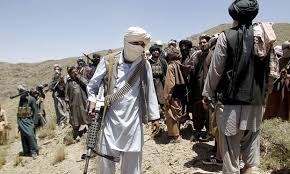Islamabad, Oct 21 – Senior members of the Taliban’s political commission based in Qatar have travelled to Pakistan for discussions with security officials there about possible peace talks with the Afghan government.
The development follows the revelation this week that Taliban officials held two rounds of secret talks with Afghanistan’s spy chief and a senior US diplomat in the capital of the Gulf state, Doha, this month and last month – meetings Pakistan was excluded from despite its long association with the Islamist movement.
Two sources within the insurgency told the Guardian that a trio of Taliban diplomats left Doha on Wednesday with a mission to hold talks with Pakistani officials.
“The visiting Afghan Taliban delegation will discuss various topics, including peace talks, and share the latest information with Pakistan,” a senior official told the Guardian.
The men are Maulvi Shahabuddin Dilawar, a former ambassador to Pakistan, Mullah Jan Muhammad Madani, a former foreign minister under the Taliban regime in the 1990s, and Mullah Abdul Salam, a former deputy education minister.
The Taliban official said the discussions being held in Pakistan follow successful contacts made with both Afghan and US officials in recent months.
“Taliban and the Americans have been engaged in a number of rounds of talks in Qatar,” he said. “They have made some progress, on a very zigzag path. God willing, we hope further talks will create progress.”
Last year Pakistan succeeded in establishing itself as the host and broker of an effort to end the 15-year insurgency in Afghanistan. Islamabad managed to bring Taliban, US and Chinese diplomats around the same table at a breakthrough meeting in the Pakistani hill resort of Murree in July 2015.
But a scheduled second meeting never took place after the Afghan government confirmed that the former Taliban leader Mullah Omar had died years previously and that the movement had been run in his name by Mullah Akhtar Mansoor.
After a bitter leadership fight, Mansoor formally became the Taliban leader but showed little interest in re-engaging in the Pakistan-brokered process.
Mansoor was killed by a US drone strike in May, creating further uncertainty about the chances of peace talks.
Although Pakistan has been a key ally for the Taliban during both its rise to power in the 1990s and its re-emergence as an anti-Nato insurgency after 2001, some within the movement resent Pakistani interference in the Taliban’s affairs.
A Taliban official who talked to the Guardian said the group’s current leader, Mullah Haibatullah Akhundzada, had sought to “speed up” talks with Kabul and the US.
He said: “Pakistan and the rest of the neighbours will be gradually brought on board. Pakistan is an important neighbour and no doubt they will want to be involved.”
But a western official who was aware that at least two of the Taliban envoys had travelled to Pakistan said the envoys’ meeting was unlikely to be related to the recent Doha talks.
The official said it was an attempt by Islamabad to wrest back control and escape “immense US pressure and international isolation”.
“They and a group from Quetta are talking to the Pakistanis about a Pakistan-led process,” the official said. “This is a separate initiative to escape US and Chinese pressure.”
The official said some within the Taliban had objected to the way members of the political commission appear to have been summoned to Islamabad.
The Taliban is split between rival factions, both among and between commanders on the battlefield in Afghanistan and those living inside Pakistan. Bitter divides exist over whether to pursue peace talks or not, as well as over the control of money and resources.
The western official described the current situation within the movement as “chaos as normal”.
Quoting a Taliban official, the Associated Press reported this week that the head of the Doha office had not taken part in the talks with the Afghan government, reflecting “a continuing power struggle within the movement over who should run the Qatar office”.
A Pakistani intelligence official declined to comment on the latest claims.

